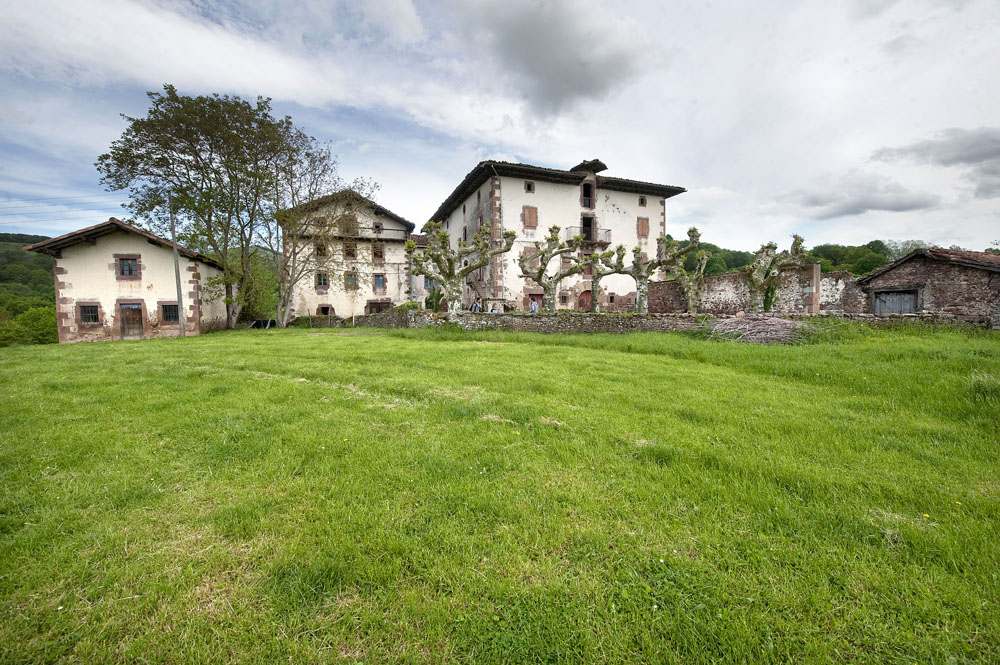The '(H)Ilnegro' Scholarship will promote the writing of the black novel
- The call has been presented by the (H)ilnegra association, the City Council of Baztan and the publishing house Chalaparta, and the works can be sent until June 23.
Elurre Iriarte recalls the beginning of the week of the Basque black novel in Baztan, which “started from a group of readers in conversation with writers and for three years we have been organizing various events around or under the pretext of the black novel”. He recalled the trajectory of these years, the website developed and the steps taken and stressed that it was time to take another step: “I think it’s interesting to be able to contribute to black literature every year with the City Council and the Basque Country. We found the opportunity to extend our hobby to creativity and translation useful. To have Basque creators among us, and to be able to read the interesting black novels that are there in our language.”
Mikel Soto, editor of Chalaparta, has provided basic information about the scholarship, highlighting that it will reward creation in one year and translation in the next. He then stressed that “in our culture and literature in the dialectic between the center and the periphery this scholarship will continue to be created in Baztan and supported by an editorial in Tafalla”.
This year’s jury will include Soto himself, Joseba Otondo and journalist Amagoia Iban. He highlights the dedication and joy he feels as an editor and encourages writers and translators from the Basque Country to participate in the scholarship in the hope that the works that will be created and translated will be enjoyed by Basque readers.
Finally, Mayor Joseba Otondo talks about Baztan’s old connection with the black novel: “Fifteen Days in Urgain by José Antonio Loidi, the first black novel in Basque, was published in 1955. As is well known, Loidi and the house of Zatonea in Elizondo have been closely connected, even though Loidi himself is a Irundian. In the same way, Mariano Izeta’s Dinero perdiente (Losing Money) was an important contribution to the genealogy of the Basque black novel. In fact, it was the second black novel to be published in Basque, in this case in 1962. More novels will follow, and many of them will have their plot in Baztan, in some of them in their entirety – as in the letters of the Post-Ecclesiastical Bishop of Garate – and in others, in most cases, in part”. As Soto, Otondo refers to the dialectic between center and periphery in the Basque Country, “In this center-periphery dialectic, which is often mentioned in the Basque community, our vocation is to be at the center. In the context of all the initiatives and events that have been taking place in the valley for some time now, the City Council of Baztan wants to organise the scholarship of (H)Ilnegra, a Basque black novel.”
The Mayor highlighted the contributions that the scholarship will make possible, such as “having the initiative to prestige and raise our voice in the normalization of the Basque language. Make a new contribution to the Basque community, a black genre with great weight in literature, to taste and enjoy Basque as well. And in the same way, in our literary system, to promote the work of writers and translators.”
The bases of the award will be published on the website of the Baztan Town Hall and the projects of novels or black stories can be submitted by mail or in person to the Town Hall register between June 23. Then, before September 15th, the winner will decide which project to award and from there, the winner will have one year to complete the work.
This news has been published by Radio Euskalerri and has been brought to LUZ thanks to the CC-by-sa license.
Hilaren 24tik 30era bitartean egingo dute aurtengo (H)ilbeltza, Baztango nobela beltzaren astea. Aurtengo programazioa aurkezteko spota argitaratu dute asteazken honetan.
Aurten ez dute nobela beltzaren asterik izan Baztanen, (H)ilbeltzaren antolatzaileek urtean zehar sakabanatu baitituzte jarduerak. Asteartean jakinarazi dutenez, baina, 2022an berriz egingo dute astebeteko (H)ilbeltza jaialdia.
(H)Ilbeltza Euskal Nobela Beltzaren Asteak aurtengo edizioa iragartzeko spot-a argitaratu du urteko bigarren egunean. Beltz kutsukoa da iragarkia eta, noski, krimen baten berri ematen digu.









ilbeltza-(1).jpg)













